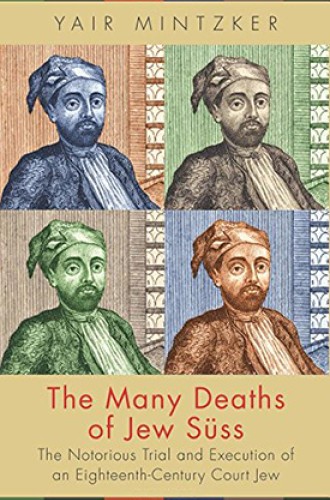Who was Joseph Oppenheimer, and why was he killed?
Yair Mintzker doesn't know. He's more interested in why other historians keep trying to write a 19th-century novel about the 18th-century case.
At the center of Yair Mintzker’s book is the blank shape of the man whose trial and death he recounts. Joseph Oppenheimer, known as “Jew Süss,” was a “court Jew” who was executed in 1758 in Württemberg after being accused of various financial and moral crimes. Historians possess an unusually rich trove of documents pertaining to Oppenheimer’s death.
But the proliferation of documentation does not create a coherent portrait. Who was the man at the center of this controversy? What were his deepest commitments? Why did the courts go to such great lengths to prove the case against him? Who wanted him dead and why? Why did his death resonate out into the broader community, taken up in fiction and legend? The man remains a “pictorial negative space, a structuring absence.”
Read our latest issue or browse back issues.
Mintzker does not have any more answers to these questions than did previous historians who approached this subject. He is interested, however, in pursuing a kind of history that he calls polyphonic or polyvocal. Why, he wants to know, are historians still working as if their task were to write a 19th-century novel? Why have our narrative structures not changed when so much else about our understanding of history has?
The author sets out to write the history of Oppenheimer’s trial in four voices. The book’s four sections examine the circumstances and lives of four people who served as witnesses to Oppenheimer’s life and death: Philip Frederick Jäger, the judge-inquisitor whose account of Oppenheimer cleared the way for his execution; Christian David Bernard, a Jewish convert to Christianity who spent time with Oppenheimer at the end of his life; Mordecai Schloss, who composed an account of Oppenheimer’s life that was widely read in the Jewish community; and David Fassman, a popular writer who included Oppenheimer in his tales from the land of the dead.
Mintzker compares his method to the method of the Gospels. Each Gospel writer had a particular perspective, which is both revealed and concealed in the text that they present. The accumulation of the four perspectives is not a definitive biography but a rich set of interlocking puzzles that require interpretation. Mintzker thus argues that his method is ancient and radically new.
Mintzker has no intention of settling into the question of which account is more right or more wrong—although he points out inaccuracies, fallacies, and outright fictions when he sees them. The question he is pursuing is about the nature of historical truth. Unlike some postmodernists, Mintzker does not reject truth as an impossibility. He does, however, see it as layered, textured, interested, and multivocal. The “truth” doesn’t belong to any one voice, including his own. He demonstrates how, in accounts of Oppenheimer’s life, “reality and repute, truth and fiction” are woven tightly together and cannot be pulled apart. By exploring the lives of each of these witnesses, we can understand how perspective importantly shapes fact and is inseparable from fact. In the end, we have a “true story that never happened.”
At the end of each of the book’s four sections, Mintzker presents a dialogue between author and reader. Although his imagined reader is a more astute observer of the text than I could be, many of the objections that Mintzker’s imagined reader poses to the book’s method were objections that I also had. At the end of the section on Mordecai Schloss, for example, the imagined reader wonders why there was so much detail about the life of Schloss’s son-in-law. Perhaps she should have seen that the excursion demonstrates the intersection of Schloss and Oppenheimer in a new way.
As for this reader, I was already strained from reading about the 18th-century trial of a person I had never heard of and detailed accounts of family members.
Mintzker wants to give historians a way forward when, as so often is the case, they run into contradictory sources. Instead of being forced to choose one narrative line over another, he wants to allow those contradictory lines to inform each other and remain unresolved. The “real Oppenheimer” never does stand up in this book. If anything, he recedes into a deeper distance. But as a demonstration of the multivalent, polyvocal nature of historical truth, Mintzker’s strange book succeeds.







